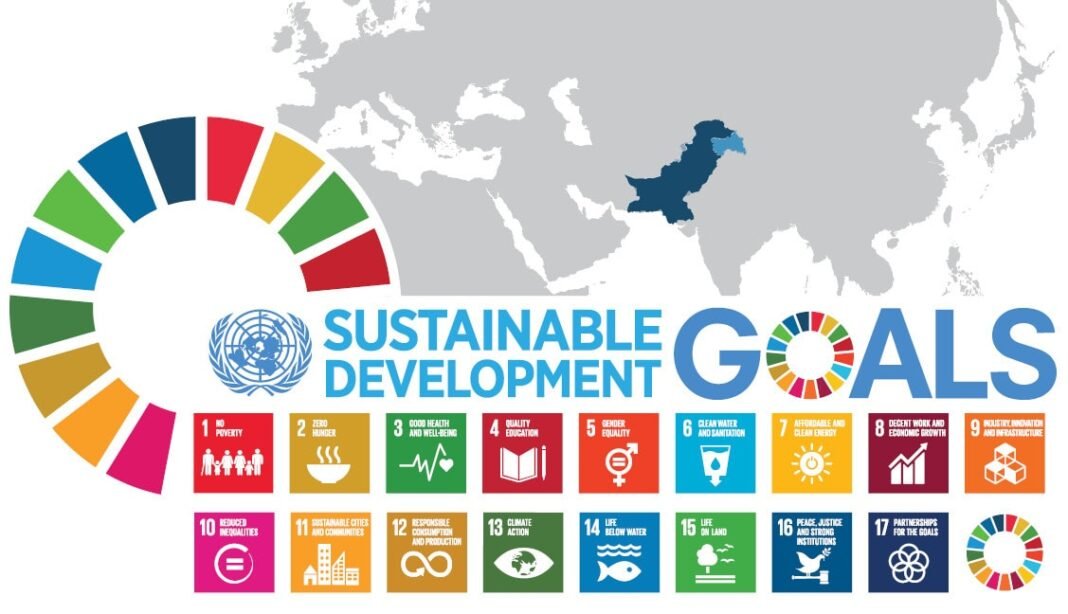Shameen Shafiq
The most recent Sustainable Development Goal (SDG) Index rating, according to the Sustainable Development Report 2023, places Pakistan at 128th out of 166 nations, with an overall score of 59.0%. This ranking illustrates the country’s progress towards meeting the United Nations’ 17 Sustainable Development Goals. Pakistan’s record in climate action is hailed as a beacon of success despite facing several hurdles.
The Sustainable Development Goals, approved by all United Nations member states in 2015, represent a global call to action to eradicate poverty, safeguard the environment, and ensure that all people experience peace and prosperity by 2030. However, Pakistan’s journey towards achieving these ambitious objectives is fraught with challenges, ranging from internal conflicts to global economic pressures. This article discusses the issues that Pakistan faces in its pursuit of sustainable development and considers viable solutions.
Regional and Internal Instability
The ongoing threat of chaos and instability in Pakistan creates a huge hurdle for sustainable development. This volatility diverts resources away from development projects, stifles foreign investment and aid, and creates an atmosphere in which sustainable development efforts struggle to gain momentum. The country’s slow economic development, political unrest, and foreign economic pressures further exacerbate the problems.
The combination of internal and external variables has resulted in a perilous economic scenario, making it impossible to focus on long-term growth and development. Furthermore, political instability, polarization, and an impending election year all contribute to Pakistan’s issues.
Suitability and availability of resources
Finding appropriate and sufficient resources for sustainable initiatives in Pakistan is a significant challenge. This includes everything from renewable energy to sustainable agriculture techniques. The adaptation of these technologies to Pakistan’s distinct environmental and socioeconomic landscape is critical but frequently difficult due to a lack of infrastructure, technology, and skilled labor.
Research on Pakistan’s sustainable energy transition highlights the country’s ability to shift towards renewable energy, emphasizing the necessity of private investment in renewables, particularly in rural and off-grid areas. The economic value of natural resources and their impact on economic growth underscores the need for implementing and promoting clean energy derived from renewable sources.
Furthermore, the Sustainable Development Goals emphasize responsible consumption and production, and the protection and conservation of natural ecosystems, such as seas and land, which are vital to Pakistan’s unique environmental setting.
Governance Issues
Pakistan faces significant challenges in achieving the effective governance necessary for successfully attaining sustainable development goals. Issues such as corruption, policy inconsistencies, and a lack of cooperation across administrative levels are prominent. These constraints not only impede efficient resource utilization but also hinder international collaboration and investment.
Despite Pakistan’s commitment to the 2030 Agenda for Sustainable Development and the adoption of the 17 Sustainable Development Goals (SDGs), the country’s progress towards these objectives has stalled. Achieving the SDGs in Pakistan is likely to be challenging without addressing historical injustices, structural policy challenges, and the need for national classification of the SDGs, improved data collection, and implementation of monitoring procedures.
Poverty, unemployment, and the global economy present additional challenges for Pakistan. The fluctuations in the global economy pose a particular threat to the country, given its status as a developing nation. Economic downturns can lead to reduced financing for development initiatives and increased debt.
Pakistan faces substantial concerns regarding poverty and unemployment that must be addressed to achieve long-term growth. The country’s poverty rate increased from 34.2% in 2022 to 39.4% in 2023. Unemployment persists as an ongoing issue, exacerbated by factors such as a growing population, a deficient education system, and sluggish economic growth. These challenges hinder the implementation of the UN Sustainable Development Goals (SDGs) in Pakistan.
Population Growth
Pakistan’s rapidly expanding population poses a significant issue. The country’s population is predicted to reach 404.68 million by 2092, with a high birth rate of 22 births per thousand people and an average population growth rate of 2.40% between 1998 and 2017.
To address this challenge, Pakistan must prioritize population management through education, healthcare access, and family planning. By investing in these sectors, the government can move towards achieving sustainable development goals. Furthermore, developing efforts to eliminate poverty, improve living conditions, and generate employment opportunities is critical for reducing the impact of population expansion on the economy and society.
A Roadmap for Addressing the Challenges
As Pakistan navigates through the complexities of sustainable development, all sectors of society need to work together. Recognizing the numerous obstacles, from geopolitical instability to pressing concerns like poverty and unemployment, attaining the Sustainable Development Goals requires resilience, creativity, and teamwork.
Pakistan needs to adopt a multifaceted approach that places a high priority on technical innovation, strategic alliances, and good governance to navigate its path toward sustained prosperity.
Addressing the issues of instability, resource scarcity, and governance is essential in the fight against poverty and unemployment.
Additionally, promoting inclusive economic growth is crucial. Pakistan can enhance its ability to withstand fluctuations in the global economy and facilitate the attainment of the Sustainable Development Goals by utilizing international collaboration, allocating resources towards renewable energy and infrastructure, and instituting extensive education and healthcare programs to control population expansion.
This integrated strategy will ensure a sustainable and successful future for all its citizens while keeping the ambitious targets established by the United Nations within reach.
*The author is a student of International Relations
**The opinions in this article are the author’s own and may not represent the views of The Diplomatic Insight. The organization does not endorse or assume responsibility for the content.
The Diplomatic Insight is a digital and print magazine focusing on diplomacy, defense, and development publishing since 2009.



